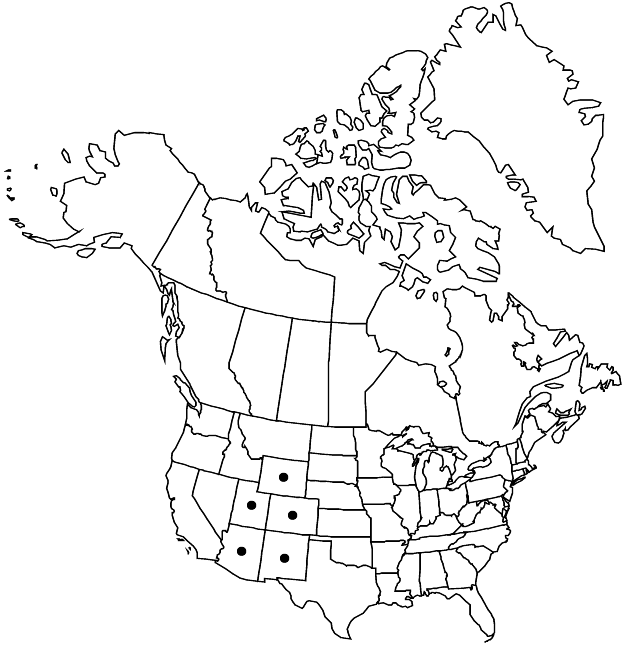Difference between revisions of "Eriogonum arcuatum"
Pittonia 4: 319. 1901.
FNA>Volume Importer |
RevisionBot (talk | contribs) m (Bot: Adding category Revised Since Print) |
||
| (6 intermediate revisions by 3 users not shown) | |||
| Line 6: | Line 6: | ||
|place=4: 319. 1901 | |place=4: 319. 1901 | ||
|year=1901 | |year=1901 | ||
| + | }} | ||
| + | |special_status={{Treatment/ID/Special_status | ||
| + | |code=E | ||
| + | |label=Endemic | ||
}} | }} | ||
|basionyms= | |basionyms= | ||
| Line 11: | Line 15: | ||
|name=Eriogonum jamesii var. arcuatum | |name=Eriogonum jamesii var. arcuatum | ||
|authority=(Greene) S. Stokes | |authority=(Greene) S. Stokes | ||
| + | |rank=variety | ||
}} | }} | ||
|hierarchy=Polygonaceae;Polygonaceae subfam. Eriogonoideae;Eriogonum;Eriogonum subg. Oligogonum;Eriogonum arcuatum | |hierarchy=Polygonaceae;Polygonaceae subfam. Eriogonoideae;Eriogonum;Eriogonum subg. Oligogonum;Eriogonum arcuatum | ||
| Line 22: | Line 27: | ||
-->{{Treatment/Body | -->{{Treatment/Body | ||
| − | |distribution= | + | |distribution=Ariz.;Colo.;N.Mex.;Utah;Wyo. |
|discussion=<p>Varieties 3 (3 in the flora).</p><!-- | |discussion=<p>Varieties 3 (3 in the flora).</p><!-- | ||
--><p><i>Eriogonum arcuatum</i> has long been included under <i>E. jamesii</i>, primarily as the <i></i>var.<i> flavescens</i>. It has also gone under the name <i>E. bakeri</i>, published by Greene about six weeks after he published <i>E. arcuatum</i>; the Fort Collins, Colorado, entomologist and botanist Charles Fuller Baker collected the types of both.</p> | --><p><i>Eriogonum arcuatum</i> has long been included under <i>E. jamesii</i>, primarily as the <i></i>var.<i> flavescens</i>. It has also gone under the name <i>E. bakeri</i>, published by Greene about six weeks after he published <i>E. arcuatum</i>; the Fort Collins, Colorado, entomologist and botanist Charles Fuller Baker collected the types of both.</p> | ||
| Line 55: | Line 60: | ||
-->{{#Taxon: | -->{{#Taxon: | ||
name=Eriogonum arcuatum | name=Eriogonum arcuatum | ||
| − | |||
|authority=Greene | |authority=Greene | ||
|rank=species | |rank=species | ||
| Line 62: | Line 66: | ||
|basionyms= | |basionyms= | ||
|family=Polygonaceae | |family=Polygonaceae | ||
| − | |distribution= | + | |distribution=Ariz.;Colo.;N.Mex.;Utah;Wyo. |
|reference=None | |reference=None | ||
|publication title=Pittonia | |publication title=Pittonia | ||
|publication year=1901 | |publication year=1901 | ||
| − | |special status= | + | |special status=Endemic |
| − | |source xml=https:// | + | |source xml=https://bitbucket.org/aafc-mbb/fna-data-curation/src/2e0870ddd59836b60bcf96646a41e87ea5a5943a/coarse_grained_fna_xml/V5/V5_757.xml |
|subfamily=Polygonaceae subfam. Eriogonoideae | |subfamily=Polygonaceae subfam. Eriogonoideae | ||
|genus=Eriogonum | |genus=Eriogonum | ||
| Line 74: | Line 78: | ||
}}<!-- | }}<!-- | ||
| − | -->[[Category:Treatment]][[Category:Eriogonum subg. Oligogonum]] | + | --> |
| + | |||
| + | [[Category:Treatment]] | ||
| + | [[Category:Eriogonum subg. Oligogonum]] | ||
| + | [[Category:Revised Since Print]] | ||
Latest revision as of 17:05, 6 November 2020
Herbs, spreading to often compact mats, 0.2–2.5 × 2–10 dm, floccose. Stems: caudex absent or spreading; aerial flowering stems erect or nearly so, slender, solid, not fistulose, usually arising directly from a taproot, 0.2–2 dm, floccose. Leaves basal, typically not in rosettes; petiole 0.5–2 cm, tomentose to floccose; blade oblanceolate or oblong to elliptic, 0.5–3 × 0.5–1.5 cm, densely tomentose abaxially, mostly floccose and grayish or greenish adaxially, margins entire, plane. Inflorescences umbellate or compound-umbellate, occasionally capitate or even reduced to single involucre, 0.3–2 × 0.3–2 dm; branches floccose; bracts 3–8, semileaflike at proximal node, 0.3–2 × 0.2–1 cm, often scalelike distally. Involucres 1 per node, usually campanulate, 3–7 × 3–8 mm, floccose; teeth 5–8, erect, 0.1–0.5 mm. Flowers 4–8 mm, including 0.7–2 mm stipelike base; perianth yellow, densely pubescent abaxially; tepals dimorphic, those of outer whorl lanceolate to elliptic, 1.5–5 × 1–3 mm, those of inner whorl lanceolate to fan-shaped, 1.5–7 × 2–4 mm; stamens exserted, 2–4 mm; filaments pilose proximally. Achenes light brown to brown, 4–5 mm, glabrous except for sparsely pubescent beak.
Distribution

Ariz., Colo., N.Mex., Utah, Wyo.
Discussion
Varieties 3 (3 in the flora).
Eriogonum arcuatum has long been included under E. jamesii, primarily as the var. flavescens. It has also gone under the name E. bakeri, published by Greene about six weeks after he published E. arcuatum; the Fort Collins, Colorado, entomologist and botanist Charles Fuller Baker collected the types of both.
Selected References
None.
Lower Taxa
Key
| 1 | Involucres (3-)4-8 mm wide; inflorescences umbellate or compound-umbellate, rarely capitate; flowers (4-)5-8 mm; below 3000 m; n Arizona, c and w Colorado, nw New Mexico, e Utah, se Wyoming | Eriogonum arcuatum var. arcuatum |
| 1 | Involucres 3-5 mm wide; inflorescences capitate, rarely umbellate or reduced to single involucre; flowers 4-5(-6) mm or 6-7 mm; usually above 3000 m in c Colorado, or 1600-1900 m in sw Utah | > 2 |
| 2 | Flowers 4-5(-6) mm; Zion National Park, Utah | Eriogonum arcuatum var. rupicola |
| 2 | Flowers 6-7 mm; Rocky Mountains, Colorado | Eriogonum arcuatum var. xanthum |